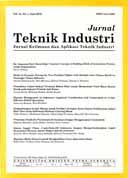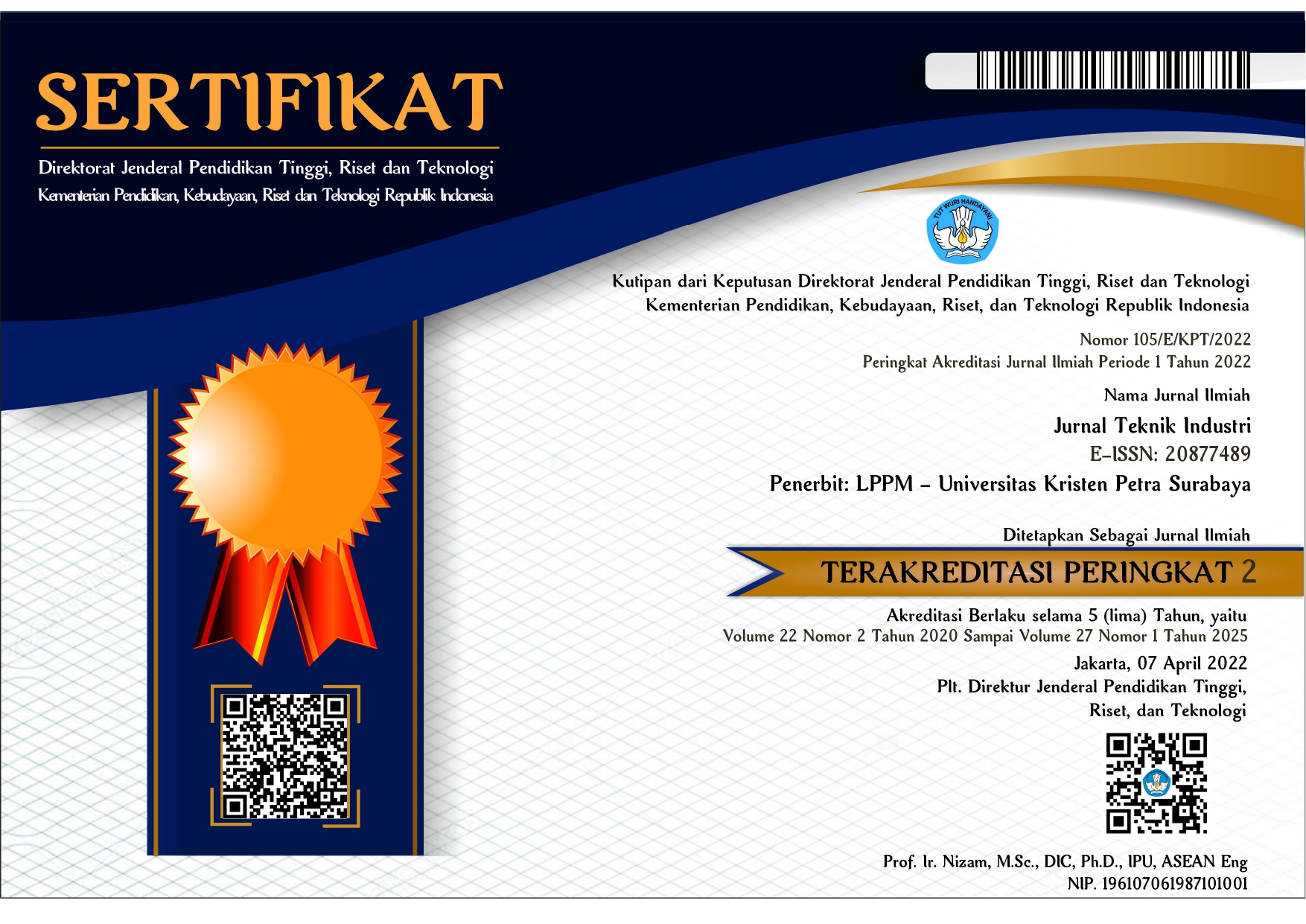Five Key Strategies for Reducing Dwelling Time in the Ports of Indonesia
 :
:
https://doi.org/10.9744/jti.22.2.133-142
Keywords:
Dwelling Time, Key Success, Ports in IndonesiaAbstract
This paper discusses the implementation of five key strategies of reducing dwelling time at ports. The five strategies are deregulation of administrative procedures, availability of infrastructure and port facilities, integration of information technology, quality of services, price and incentive strategies. By using partial least squares method and bootstrapping testing, these five variables are a good fit, reliable, and robust as a factor for reducing dwelling time at the port. However, the implementation at Ports in Indonesia still needs to be improved. Four strategies have been running well and they have a significant effect either directly or indirectly on the decrease of dwelling time, namely deregulation of administrative procedures, availability of infrastructure and port facilities, integration of information technology, dan quality of services. While price and incentive have not been maximized to reduce dwelling time at Ports in Indonesia.
References
Caldeirinha, V., J. Augusto Felício, and S.F. da Cunha, Government policies and Portuguese port governance in the period from 2005 to 2015. Research in Transportation Business & Management, 2017. 22: p. 11-20.
World Bank, State of Logistics Indonesia 2015. 2015.
World Bank, State of Logistics Indonesia 2013. 2013.
OECD, Time Efficiency at World Container Ports. International Transport Forum, 2014.
Pelindo, Advancing Excellence Through Performance. Laporan Tahunan Pelindo II Tahun 2015, 2015.
Pelindo, Annual Report Pelindo 2 Year 2016. 2016.
Artakusuma, A., Analisis Import Container Dwelling Time Di Pelabuhan Peti Kemas Jakarta International Container Terminal (JICT) Tanjung Priok. 2013.
Adam, S., Simulation And Otimization Dwelling Time With Arena. A thesis submitted in partial fulfilment of the requirements for the Degree of Master of Applied Science (Transport Studies) Lincoln University, 2009.
Ferrari, C., F. Parola, and A. Tei, Governance models and port concessions in Europe: Commonalities, critical issues and policy perspectives. Transport Policy, 2015. 41: p. 60-67.
Yang, D., A.T.H. Chin, and S. Chen, Impact of politics, economic events and port policies on the evolution of maritime traffic in Chinese ports. Maritime Policy & Management, 2013. 41(4): p. 346-366.
Sambrani, V.N., PPP from Asia and African Perspective towards Infrastructure Development: A Case Study of Greenfield Bangalore International Airport, India. Procedia - Social and Behavioral Sciences 157 2014: p. 285 - 295.
Stern, J. and S. Holder, Regulatory governance: criteria for assessing the performance of regulatory systems An application to infrastructure industries in the developing countries of Asia. Utilities Policy 8, 19999: p. 33-50.
Talley, W.K. and M. Ng, Hinterland transport chains: Determinant effects on chain choice. International Journal of Production Economics, 2017. 185: p. 175-179.
Yang, Y.-C., A Comparative Analysis of Free Trade Zone Policies in Taiwan and Korea based on a Port Hinterland Perspective. The Asian Journal of Shipping and Logistics, 2009. 25(2): p. 273-303.
Cepolina, S. and H. Ghiara, New trends in port strategies. Emerging role for ICT infrastructures. Research in Transportation Business & Management 8 2013: p. 195-205.
Customs, Customs Clerance and Joint Gate TPS in Tanjung Priok Port. 2015.
The Secretariat for the Committee on Infrastructure Planning Commission, G.o.I., Customs Procedures and Functioning of Container Freight Stations and Ports. 2005.
Pelindo, The Strategy of Developing the Port of Tg Priok as an Interface for Province of West Java and Jakarta. 2013.
Sirajuddin, T.Y. Zagloel, and Sunaryo, Model of Governance and Port Performance Improvement Strategy in Indonesia. 2017 6th IEEE International Conference on Advanced Logistics and Transport (ICALT), 2017. 2017: p. 189-194.
Caldeirinha, V.R., J.A. Felicio, and J. Coelho, The influence of characterizing factors on port performance, measured by operational, financial and efficiency indicators. Recent Advances in Environment, Energy Systems and Naval Science, 2013.
Lupo, T., Strategic Analysis of Transit Service Quality Using Fuzzy AHP Methodology. European Transport, 2013(53).
Sayareh, J., S. Iranshahi, and N. Golfakhrabadi, Service Quality Evaluation and Ranking of Container Terminal Operators. The Asian Journal of Shipping and Logistics, 2016. 32(4): p. 203-212.
Li-Wen Chena and Hsin-Yi Yub, Corporate governance, political involvement, and internationalization: An empirical investigation in Japan and Taiwan. Research in International Business and Finance, 2016.
Harjanti, D., Burnout and Employee Performance in Hospitality Industry: The Role of Social Capital. Jurnal Teknik Industri, 2019. 21(1): p. 15-24.
Downloads
Published
How to Cite
Issue
Section
License
Articles published in the Jurnal Teknik Industri: Jurnal Keilmuan dan Aplikasi Teknik Industri will be Open-Access articles distributed under the terms and conditions of the Creative Commons Attribution License (CC BY).
![]()
This work is licensed under a Creative Commons Attribution License (CC BY).



















